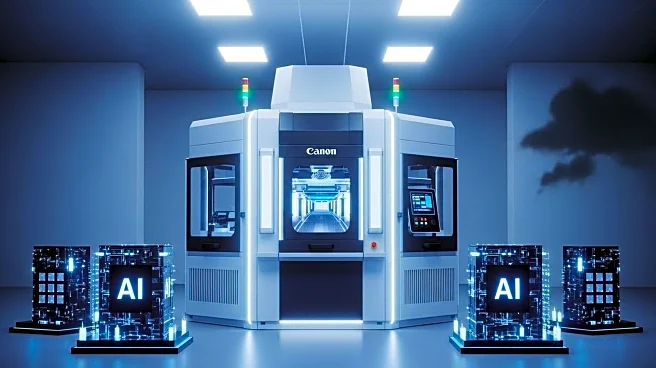What's Happening?
ASML, the leading supplier of computer chip-making equipment, has reported strong third-quarter bookings, driven by increased investments in artificial intelligence (AI). The company announced net bookings of 5.40 billion euros, surpassing analysts' expectations
of 5.36 billion euros. This growth is attributed to the rising demand for advanced logic and memory chips used in AI applications. However, ASML has cautioned that sales to China are expected to decline significantly next year. This follows a period where Chinese sales constituted nearly half of the company's revenue in 2024 and a third in 2025. The decline is described as a 'normalization' rather than a result of stockpiling amid ongoing U.S.-China trade tensions. ASML is restricted from selling its most advanced tools in China due to U.S.-led export restrictions, although it claims these restrictions will not impact its short-term operations.
Why It's Important?
The announcement highlights the dual impact of geopolitical tensions and technological advancements on the semiconductor industry. ASML's strong performance in AI-related sales underscores the growing importance of AI in driving demand for semiconductor equipment. However, the anticipated decline in Chinese sales reflects the broader challenges posed by international trade restrictions and geopolitical conflicts. This situation could affect ASML's revenue streams and influence global supply chains, particularly in the semiconductor sector. Companies like TSMC, Intel, and Samsung, which rely on ASML's lithography tools, may face adjustments in their production strategies due to these shifts. The broader implications for the industry include potential changes in market dynamics and investment strategies as companies navigate these complex challenges.
What's Next?
ASML plans to communicate new targets in January, which may provide further insights into its strategic response to the changing market conditions. The company anticipates flat sales growth in 2026, with potential for growth in 2027. Stakeholders, including investors and industry partners, will be closely monitoring these developments to assess ASML's ability to adapt to geopolitical pressures and capitalize on AI-driven opportunities. The ongoing U.S.-China trade tensions and export restrictions will likely continue to influence ASML's operations and strategic decisions, potentially prompting shifts in its market focus and investment priorities.
Beyond the Headlines
The situation raises important questions about the long-term impact of geopolitical tensions on technological innovation and global supply chains. ASML's experience highlights the delicate balance between leveraging technological advancements and navigating international trade policies. The company's ability to maintain growth amid these challenges could serve as a case study for other firms facing similar geopolitical pressures. Additionally, the focus on AI-driven demand underscores the transformative potential of AI technologies in reshaping industries and driving economic growth, despite geopolitical hurdles.















